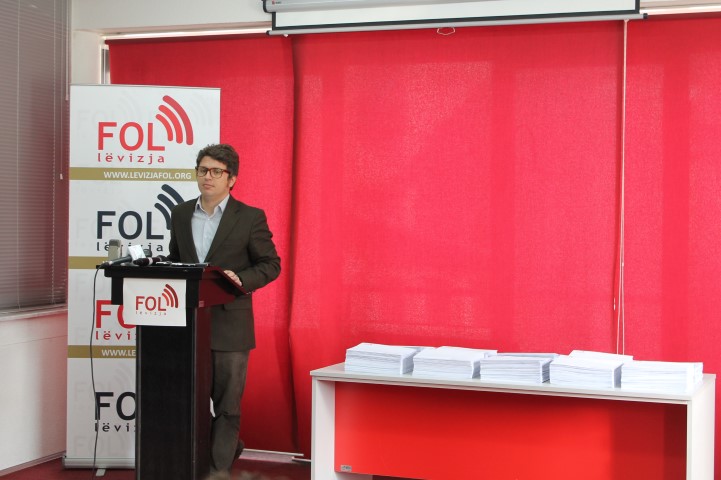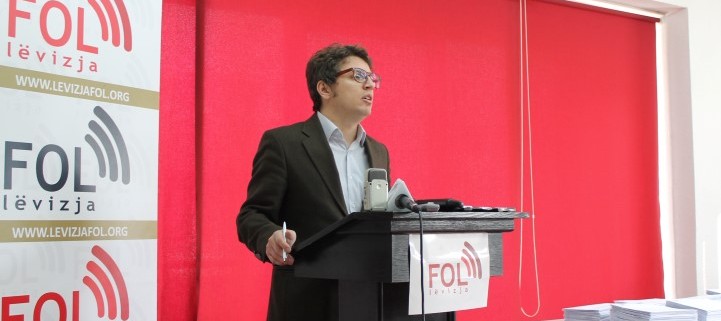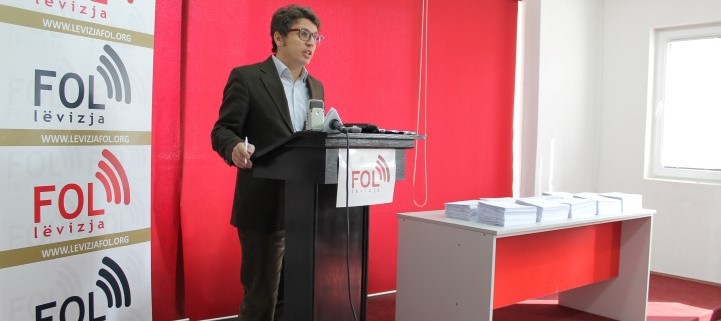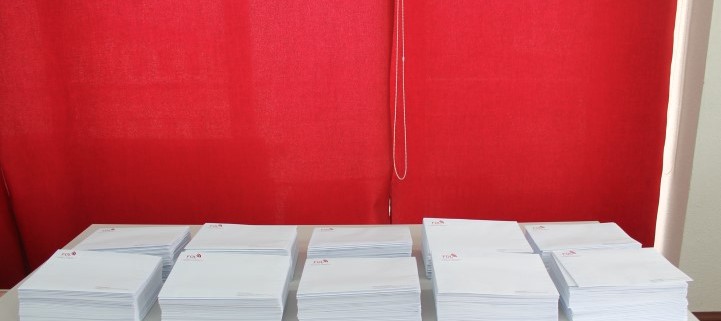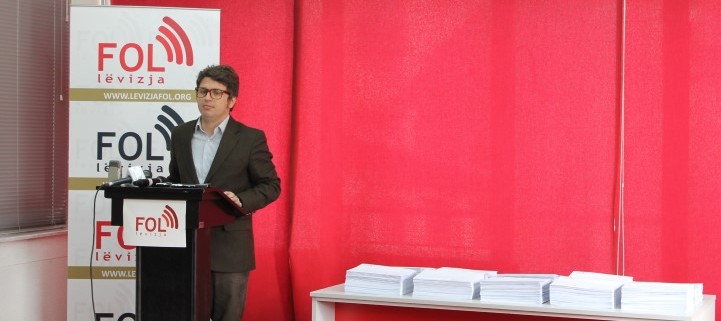Open Letter to EU Leadership and EU’s Representations and Presence in Kosovo
Prishtina, 24th February 2014 – Today, FOL Movement held a press conference and presented an open letter addressed to the European Union institutions on visa liberalization process for Kosovo.
Petrit Zogaj, from FOL Movement hereby declared that ” FOL Movement, as a civil society organization, through this letter expresses its concern about Kosovo and its citizens regarding the situation they are in terms of the perspective of visa liberalization”. According to him “Considering their efforts so far, from the perspective of civil society and the general public, we consider that all institutions and political authorities in Kosovo, on the one hand, and the EU, on the other hand, has not yet have shown dedication, professional skill, sincerity and seriousness in meeting all the criteria provided by Guide on visa liberalization for Kosovo “.
Through this letter, FOL has addressed a number of claims which are regarded as key points when starting with addressing the deep concerns brought in this letter.
• First of all, both parties should come up with a joint assessment that clearly shows each criterion, one by one, that Kosovo has met so far and a list of other criteria that are still to be met.
• Secondly, they should also define clear lines of accountability for Kosovo, and the EU as well as, and apply this to the public.
• Thirdly, they should establish and maintain the accountability and transparency to the public and improve the participation of civil society.
• Fourth, the role of EULEX and its future are inevitably linked with visa liberalization process. Regarding its role, the guide clearly defines the criteria which EULEX, with an effective involvement should meet.
• Finally, the political dialogue with Member States is crucial. This requires that all relevant political decision makers (including legislators) from both sides, should interact much more with one other in building a deeper understanding of all the requirements and challenges that Kosovo is facing in order to meet each criteria.
Petrit Zogaj also said that “through this open letter, we intend to express our citizens’ confidence that now is the time that the EU institutions and the leaders of Kosovo institutions will equally share all the concerns brought by us”. We want to believe that you will consider in your daily work all the concerns brought hereby, and many others which you already are familiar with, and do everything within your power so that the process of liberalization visa for Kosovo does not stand still due to negligence. Kosovans deserve this, whether it is supposed to end the gap between initial expectations and continuous uncertainty about the final outcome of this process. We are sure that this is also in the best interest of the EU, said Petrit Zogaj.
Please find below full version of letter:
First of all, let us express all Kosovans’ and our own gratefulness and the highest considerations for the continuous support provided to Kosovo by the EU and its Member States to its state-building and European integration path. The purpose of this letter is to share with you our deep concern on the worrying situation in which Kosovo and its citizens are found with regard to the visa liberalisation perspective.
Over a decade ago, the 2003 joint EU – Western Balkans Thessaloniki Summit marked a shift in EU’s approach to Europeanization of Balkans’ post-conflict societies. It did so by introducing the perspective of visa liberalisation, in addition to the accession process based on the mechanism of the Stabilisation and Association process (SAP). In addition to providing incentives to carry out reforms and promoting rule of law domestically, the perspective of becoming part of the ‘white Schengen’ has since been momentously perceived as a people-oriented approach expected to bring about plausible improvements in citizens’ lives beyond the highly political, comprehensive SAP. As such, it created strong expectations amongst citizens of countries across the region that EU’s policy of accession conditionality was being further endowed with values of fairness and inclusiveness, driven by freedom of movement being promoted as one of fundamental human rights across the old continent.
And not only this. Such a momentous change has gradually created a widespread belief that visa liberalization is not only about reforms and the freedom of movement as a fundamental human right, but that it also promotes socio-economic development for all. Such a belief was inspired by the expectation that, as actually promoted by the EU itself, becoming part of the ‘white Schengen’ would particularly improve access of youngsters to better education opportunities, as well as of businesspeople and professionals to more competitive markets and professional development opportunities provided by the EU internal market and regional markets. Indeed, a much more important expectation still holds, namely that once lifting of the Schengen visa regime becomes a credible political stake genuinely worthwhile to invest in for each society, it certainly acts against Euroscepticism and contributes to gradually brining their values closer to those of developed European societies. Momentously driven by such fundamental shared values and beliefs, the EU and all Western Balkans’ countries jointly took swift steps to advance from visa facilitation to visa liberalisation in roughly two years time, yet only Kosovo was excluded from this. The respective processes with these countries provided for clarity, certainty, fairness in the eyes of the public and realistic approach, combined with thorough guiding by the EU throughout the way, based on full partnership and trust.
On the other hand, though Kosovo has embarked in meeting the criteria required since 2009 and received its visa roadmap from the EU in 2012, it is about to enter the third year into this process. In addition, it is formally part of the Stabilisation and Association Process (covering, among others, the same sectors covered by this roadmap) since 2003 and expects to conclude an SAA soon this year. It is also, since 2012, involved in a so-called ‘structured dialogue on the rule of law’, an invention of its very own kind allegedly tackling the very same sectors as the roadmap does. Moreover, Kosovo enters the sixth year of hosting the biggest ever EU rule of law mission and continues the dialogue with Serbia, both portrayed as bringing it closer to the EU and improving its citizens’ lives. The two latter are embraced by Kosovo’s leadership despite decreasing popularity domestically, due to widespread public disillusionment with EULEX’s performance in actually delivering justice and rule of law and the extremely slow conduciveness of this dialogue to either improving citizens’ lives or getting any closer to the EU. On the contrary, the perspective of visa liberalisation remains as distant as ever, perhaps even murkier than for some former Soviet republics.
We want to share with you our deep worry over the fact that no one seems to have any clear idea when the last two million people living in Europe will finally join the rest of hundreds of millions fellow Europeans who enjoy the fundamental human right to free movement.
We all need to be reminded that Kosovo remains amongst the most isolated countries on the globe, with its citizens allowed to travel without a visa to only about five countries. Seen through the eyes of an ordinary citizen living this reality on everyday basis, this leaves nothing but a perception of a paradox. Such an intrinsic paradox lies precisely in the contradiction between EU’s declared willingness for Kosovo’s accession (regardless of member states’ positions vis-à-vis its statehood) and what it actually does on the ground risking to take an opposite direction during the process. It is clear that the more this process is dragged on, the more isolation would be tried to be broken by ordinary people in search of better life, also given that the accession process will certainly take at least one more decade. Seen in this light, it is imperative that potential risks of continued isolation are paid due consideration and responded to. Potential radicalisation and extremism, be it ethnic, political, religious or of any other kind, would pose very serious risks to Kosovo’s public and constitutional order, thus potentially undermining its very foundations. With communication with other, more developed societies around shut off, we risk to take the path of an insecure society.
While fully recognizing their up to date efforts, from the perspective of the civil society and the wider public, we consider that all Kosovo institutions and political actors, on one hand, and of the EU, on the other, have yet to demonstrate full and clear commitment, competence, honesty and seriousness in meeting all the criteria set out in the Visa Liberalisation Roadmap for Kosovo. Let us therefore outline a number of demands for both the EU and Kosovan institutions which we find crucial if one would want to begin addressing the deep concerns raised in this letter.
• First of all, both need to come up with a joint evaluation clearly indicating each and every criterion that Kosovo has met and an exhaustive list of each and every outstanding criterion contained in the Visa Liberalisation Roadmap for Kosovo. Such a list needs to be clear, particularly in terms of the precise measures agreed to be undertaken to meet the outstanding criteria and a timeframe of implementation. It also has to be fully and continuously transparent and easily accessible to the public. On the other hand, the EU needs to set a clear timeframe of regularly assessing Kosovo’s progress in meeting the outstanding criteria. Such a timeframe also needs to be clear structurally and in terms of exhaustive deadlines, as well as, and most importantly, treat Kosovo as fairly and equally as other Western Balkans countries previously. Such a timeframe and related documents also need to be fully and continuously transparent and easily accessible to the public. The EU needs to bear in mind that continuously adding rather marginal criteria, in whatever form, and evaluating their implementation only once in a blue moon would certainly prove to be counterproductive to actually meeting them by Kosovo, as it would only distract the focus and ultimately diminish both parties’ commitment to the very process and public trust in it. The risk of a ‘visa liberalisation fatigue’ is clearly very imminent.
• Secondly, clear lines of accountability, both on Kosovo’s and EU’s side, need to be in place and communicated to the public. This also requires clear division of responsibilities throughout the respective institutional hierarchies (as prescribed by their respective functions per se) and avoiding existing overlapping between sectors and levels of institutions, including when it comes to monitoring, reporting and evaluation. The process, nevertheless, needs to ensure inclusiveness of stakeholders and responsiveness. Last but not least in this regard, the coordination structures in place, on both sides and at all levels, need to be only instruments serving the goal (implementation of the roadmap), not degenerate into goals in themselves. One such structure seems to be the ‘structured dialogue on the rule of law’, which seems to overlap and risks becoming a goal in itself.
• Thirdly, accountability and transparency to the public and improved involvement of civil society need to be established and maintained. This requires ensuring public access to the information reflecting all the dimensions and processes conducted and engaged in since Kosovo received the roadmap and up until the end of the process. Such information includes, but is not limited to, planning, reporting and evaluation documents produced by both parties, as well as conclusions of all official meetings, in particularly those at the political level. Last but not least on transparency, joint press releases and joint media briefings are ordinary practices in any democratic political system, and as such have to be part of each and every political-level meeting on visa liberalisation between EU and Kosovo. On the other hand, civil society would bring added value to the process if allowed to bring more of its own views and exert more of organized pressure.
• Fourthly, the role of EULEX and its future are inextricably related to the visa liberalisation process. As far as its role is concerned, the roadmap clearly sets out the criteria which EULEX has to contribute to meeting though its effective involvement. Though they might be often misread as exclusively tasks of Kosovan institutions vis-à-vis EULEX as an EU mission, this finally needs to be seen as a fully-fledged mutual approach. This requires clarity on what EULEX’s precise duties are given the full nature of its mandate, particularly when it comes to its ‘executive mandate’ and issues of membership and cooperation with the relevant international and regional organisations and mechanisms, where there seems to be the least progress. In this regard, the very fact that all its member states are in favour of Kosovo becoming part of the ‘white Schengen’ allows the EU room to play a more proactive broker role towards Kosovo formally becoming a member and establishing and maintaining cooperation with such organisations and mechanisms. Moreover, both sides need to recognize the political sensitivities that might derive for Kosovo in general of endlessly extending EULEX’s mandate, particularly given the public disappointment with its performance, a perception also recognized and shared by certain EU actors at times.
• Lastly, political dialogue with member states is crucial. This requires all relevant political decision-makers (including lawmakers) on both sides, to engage much more heavily with each-other in building a thorough understanding of all the criteria and challenges facing Kosovo in meeting each of them. Next to it, this requires the Kosovan side to directly and continuously engage, under EU’s facilitation (where needed) with EU member states. And not only them, but also relevant international and regional organisations and mechanisms and regional countries. Last but not least in this regard, both parties need to think creatively on how to make the dialogue with Serbia more structurally conditioned and better linked to facilitating meeting of the visa liberalisation criteria.
To conclude, through this open letter, we seek to express our citizens’ belief that the time has come for both you and our elected leaders to equally share all the concerns raised herein. We want to believe that you will take into consideration all these and other concerns you are already familiar with in your own daily work, and undertake all that is in your power so that the visa liberalisation process for Kosovo does not stall out of neglect. Kosovans deserve this if the gap between original expectations and continued uncertainty over the finality of this process is to be brought to an end. We are sure that this is also in EU’s best interest.
